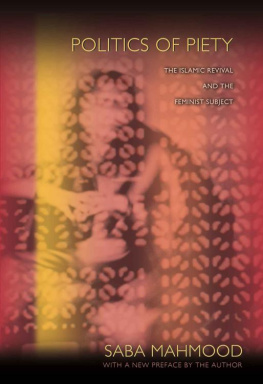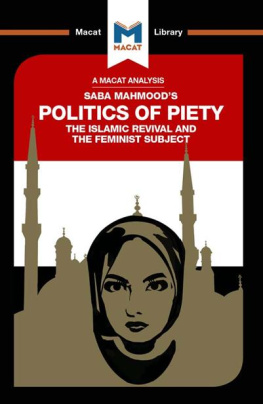Saba Mahmood - Politics of Piety
Here you can read online Saba Mahmood - Politics of Piety full text of the book (entire story) in english for free. Download pdf and epub, get meaning, cover and reviews about this ebook. year: 2011, publisher: Princeton University Press, genre: Religion. Description of the work, (preface) as well as reviews are available. Best literature library LitArk.com created for fans of good reading and offers a wide selection of genres:
Romance novel
Science fiction
Adventure
Detective
Science
History
Home and family
Prose
Art
Politics
Computer
Non-fiction
Religion
Business
Children
Humor
Choose a favorite category and find really read worthwhile books. Enjoy immersion in the world of imagination, feel the emotions of the characters or learn something new for yourself, make an fascinating discovery.
- Book:Politics of Piety
- Author:
- Publisher:Princeton University Press
- Genre:
- Year:2011
- Rating:4 / 5
- Favourites:Add to favourites
- Your mark:
- 80
- 1
- 2
- 3
- 4
- 5
Politics of Piety: summary, description and annotation
We offer to read an annotation, description, summary or preface (depends on what the author of the book "Politics of Piety" wrote himself). If you haven't found the necessary information about the book — write in the comments, we will try to find it.
Politics of Piety — read online for free the complete book (whole text) full work
Below is the text of the book, divided by pages. System saving the place of the last page read, allows you to conveniently read the book "Politics of Piety" online for free, without having to search again every time where you left off. Put a bookmark, and you can go to the page where you finished reading at any time.
Font size:
Interval:
Bookmark:
POLITICS OF PIETY
THE ISLAMIC REVIVAL AND THE FEMINIST SUBJECT
With a new preface by the author
Saba Mahmood
PRINCETON UNIVERSITY PRESS PRINCETON AND OXFORD
Copyright 2005 by Princeton University Press
Published by Princeton University Press, 41 William Street,
Princeton, New Jersey 08540
In the United Kingdom: Princeton University Press,
6 Oxford Street, Woodstock, Oxfordshire OX20 1TW
press.princeton.edu
All Rights Reserved
First printing, 2005
Paperback reissue, with a new preface, 2012
ISBN: 978-0-691-14980-6
The Library of Congress has cataloged the first edition of this book as follows
Mahmood, Saba, 1962
Politics of piety : the Islamic revival and the feminist subject / Saba Mahmood.
p. cm.
Based on the authors thesis (Stanford University, 1998).
Includes bibliographical references and index.
ISBN 0-691-08694-X (cl : alk. paper) ISBN 0-691-08695-8 (pb : alk. paper)
1. FeminismIslamic countries. 2. Muslim womenEgyptCairoReligious lifeCase studies. 3. Islamic renewalEgyptCairoCase studies. 4. FeminismReligious aspectsIslam. 5. Women in Islam. 6. Gender identityIslamic countries. I. Title: Islamic revival and the feminist subject. II. Title.
HQ1785.M34 2005
305.48697096216dc22 2004044289
British Library Cataloging-in-Publication Data is available
This book has been composed in Goudy
Printed on acid-free paper.
Printed in the United States of America
10 9 8 7 6 5 4 3 2 1
Dedicated to my father and other spirits who have watched over me....
As I write this preface to the second edition of Politics of Piety, Egypt is experiencing one of its most momentous developments since the anticolonial struggles of the early twentieth century. In a stunning display of power and perseverance, Egyptian protesters from all walks of life ousted the twenty-year-old brutal dictatorship of Hosni Mubarak on February 11, 2011. Their demands were succinct and clear: the restoration of full civil and political rights under a democratic system committed to the establishment of some measure of economic justice. The fact that this revolutionary mobilization cut across divisions of political and religious affiliations, class, and gender made this a watershed moment in the history of the postcolonial Middle East. It remains to be seen whether the ruling classes of Egypt will yield to the substantive demands of the movement or whether the inertia of the system will prove intractable. Whatever the outcome may be, this grassroots movement against a notoriously corrupt police state has certainly transformed the political consciousness of ordinary Egyptians and their sense of collective agency. As I write these lines, demonstrations have spread across the Middle East, inspired by the overthrow of the Mubarak regime, echoing similar demands. The question looms large as to what the future will hold for the inhabitants of the region.
Part of the aim of this new preface is to reflect on how the arguments of Politics of Piety are situated in relation to these developments. How should we place the politics of the dawaor pietymovement in the vast coalition that brought down the Mubarak regime? How do the arguments of the book speak to the latest turn of events in Egypt? In this preface I also address broader issues related to the reception of the book. These include: (1) the relationship between agency and politics; (2) my insistence on inserting questions of embodiment and ethics into the analysis of politics; and (3) the wider implications of my argument about dawa/Islamic piety for theoretical debates about modern religiosity. In what follows, I take up these three issues before turning to the demands posed by the present turn of events in Egypt.
My remarks will necessarily be inadequate to those who seek a response to their engagements with Politics of Piety. No author can claim to be entirely sovereign over her text. Ultimately, the arguments of this book have taken on a life of their own; they animate conversations and debates that are well beyond the aim and scope of the book itself but have now become a part of the life and reception of Politics of Piety. The remarks below are therefore written in the spirit of contributing to the engagements the text has engendered rather than asserting the sovereignty of the author over it.
Since its publication, Politics of Piety has elicited both the praise and the ire of feminists: some have hailed the book for restoring agency to religiously devout Muslim women hitherto denounced for their patriarchal proclivities. Others have condemned the book for precisely the same reason: insomuch as the book is read as an expos of the agency of the women who constitute the piety movement, it is charged with leveling critical differences between women who are upholders of patriarchal norms (dangerous, supine, submissive) and those who fight these norms in the name of liberty and freedom (heroic subjects of history). Both these readings ignore the fact that I was not interested in delivering judgments on what counts as a feminist versus an antifeminist practice, to distinguish a subversive act from a nonsubversive one. While acts of resistance to relations of domination constitute one modality of action, they certainly do not exhaust the field of human action. Rather, the aim of this book is to develop an analytical language for thinking about modalities of agency that exceed liberatory projects (feminist, leftist, or liberal). Politics of Piety, however, goes beyond describing these modalities of agency to focus on two related analytical and political problems that are far more central to its architecture: (a) the kinds of capacitiesembodied, rational, technicalthese various modalities of agency require; and (b) the conceptions of the body, personhood, and politics these capacities presuppose, enable, and construct.
My exposition of the elaborate program of self-cultivation practiced by the womens piety movement has sometimes been characterized as a hermeneutical exercise that abnegates or sidesteps questions of politics. This characterization has puzzled me, since much of the book is a reflection upon the kinds of political projects presupposed and enabled by the piety movement and those it challenges or remains indifferent toward. As I argue in this book, while the piety movement undoubtedly seems at times inimical and at times indifferent to feminism (understood as a project for establishing the conditions for gender equality), the pietists main concern lies elsewhere: namely, the cultivation of submission to what its members interpret to be Gods will. Despite the self-avowedly apolitical stance of the pietists, their practices have a profoundly transformative affect in the social and political fields. They have transformed the very ground on which nationalist, statist, and other kinds of secular-liberal projects can be envisioned and practiced. To ignore the transformative potential of the piety movement is to fail to understand its power and force in Egyptian society.
Politics of Piety is not a hermeneutical exercise in another important sense: its primary preoccupation has less to do with the meaning of practices than with the work they perform in the making of subjects, in creating life worlds, attachments, and embodied capacities. For example, while interpretations of the veil abound in Egypt, two main views prevail among its practitioners and its critics: one understands the veil to be a divine command; the other regards it as a symbolic marker, no different from other signifiers (religious and nonreligious) that represent a Muslim womans identity. In
Next pageFont size:
Interval:
Bookmark:
Similar books «Politics of Piety»
Look at similar books to Politics of Piety. We have selected literature similar in name and meaning in the hope of providing readers with more options to find new, interesting, not yet read works.
Discussion, reviews of the book Politics of Piety and just readers' own opinions. Leave your comments, write what you think about the work, its meaning or the main characters. Specify what exactly you liked and what you didn't like, and why you think so.











